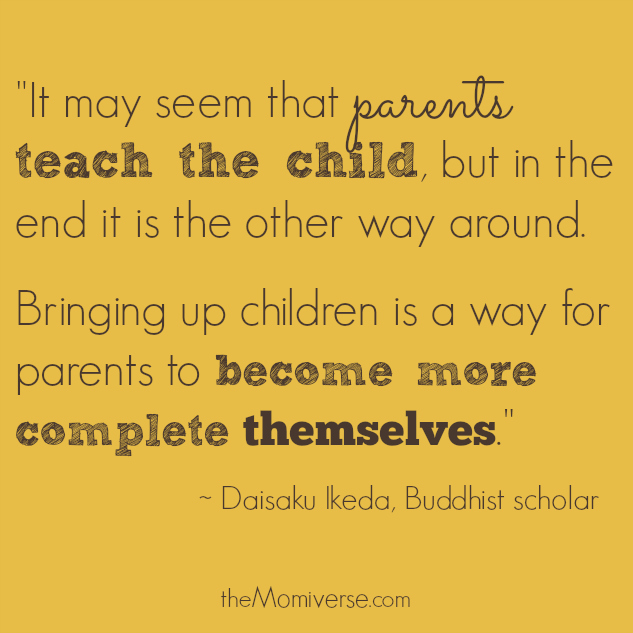{See information about book giveaway below!}
One of the oldest learn-as-you-go occupations may also be the toughest to master.
Good parenting rarely comes naturally; it takes years of hard work, and even then we all make mistakes. Parenting tests you on every level: emotionally, physically, financially, even spiritually.
Though there are no short cuts to good parenting, there are qualities you can cultivate to improve your parenting dramatically. What are these qualities? Glad you asked. I’ve narrowed them down to the ten characteristics which I’ve notice in the most outstanding parents I’ve worked with – traits we all can strive to develop.
1. A sense of humor
Parents with a healthy sense of humor are the most popular adults on the block. It’s no wonder why their kids enjoy bringing friends home. Good humor encourages open and unrestrained dialogue in families and provides relief from life’s stressors. It also reduces stress hormones, stimulates endorphins, and strengthens the immune system. Most importantly, it makes family time more fun. In contrast, parents who suffer from HDD (Humor Deficient Disorder) are real downers and tend to drag their kids down in the dumps with them. Humorlessness magnifies worries and burdens, and induces unwarranted anxiety in young people. Keep your sense of humor and pass on to your kids a spirit of playfulness and fun.
2. Flexibility
Flexible parents tend to be open-minded and easy-going. They resolve disagreements smoothly and never engage in shouting matches. After all, kids are naturally defiant; inflexible parents increase defiance and rebelliousness in their kids and always escalate conflicts. Recognize your child’s right to have a voice in family decisions. Whenever possible, hold a family meeting before making rules, offer choices, and engage your kids in dialogue. Being flexible doesn’t mean you let your kid get away with murder. Find the balance between accommodating and dominating. Your kid will reward you with greater respect and self-restraint.
3. Attunement
Attuned parents are great listeners. They refrain from offering advice, judgments, or comparisons. Quality listening soothes children better than any counsel or recommendations and fulfills two crucial childhood needs: the need to feel understood and the need to be validated. Attuned parents intuitively sense their kid’s feelings. They know when their kids are happy, upset, angry, or depressed. They respond to their kids needs directly. For this reason, their kids rarely engage in defiant or destructive behaviors.
4. Good modeling
It’s said that kids absorb ten percent of what you say and ninety percent of what you do. In other words, being the person you want your kid to be is the most powerful parenting choice you can make. Modeling lives and breathes in your behavior. Your words, actions, and feelings (spoken and unspoken) are deposited into your child and shape his or her core identity. Whether you like it or not, kids develop personal values and a life philosophy based on their parents’ choices. When it comes to your kid’s psychological health, parental modeling is as real as DNA.
5. Empowerment
Children are born with innate drives to define themselves and develop their unique strengths and talents, from their first steps to driving a car, they stubbornly want to do things on their own. Good parents nurture independence, fostering personal responsibility and encouraging self-reliance. They avoid the trappings of micromanaging or indulging their kids, and they never allow slothfulness or laziness to take root in their kid’s life. Empowering parents demonstrate to their kids the rewards of hard work and personal accomplishment. Such choices add moment to psychosocial development and provide kids with a strong sense of purpose. And remember, empowerment isn’t contingent on social status, intelligence, or bank account – you can pass it on to your kid every day cost free.
6. Structure, limits, and boundaries
Let’s review, healthy structure: providing children with consistent schedules, routines, and relationships. Healthy limits: curbing destructive or risky behaviors in kids by fostering good judgment. Healthy boundaries: teaching kids to honor and respect the physical and emotional space between people. No child is born with these constructs. Parents who provide effective leadership can only teach them. Healthy structure, limits, and boundaries lay the foundation for good habits that last a lifetime. They also nourish confidence by reducing fears and anxieties in children.
7. Altruism
I’ve seen children’s lives change on a dime when they engage in altruistic activities. They learn to see the world beyond their own wants and needs and become skilled at counting their blessings. Helping others is the best antidote that I know for self-centered or arrogant kids. It awakens their humanity, inspires greater empathy and kindness, and expands their social views. Look for hands-on opportunities or internships for your kids through local or national charitable organizations. Community service not only feels great, it also looks good on resumes or college applications.
8. Academic support
Good parents are always quick to offer academic support and cultivate solid study habits in their kids as early as possible. Tutoring, educational evaluations, test prep courses – take advantage of all your school has to offer. If the support isn’t available, go outside of the school. Once poor study habits take root, it’s very difficult to reverse them. Undiagnosed learning difficulties, even mild ones, are at the root of many behavioral and emotional problems. If your kid breezes through homework, chances are he or she is not being challenged. Talk to the teacher, arrange for extra work. Make sure that your kids are used to working hard so they don’t give up quickly when schoolwork becomes more difficult.
9. Creative and physical outlets
Children, particularly teenagers, store up a lot of tension in their bodies and need psychical outlets to relieve that tension. Playing computer or video games may provide some relief, but they’re not effective choices for personal growth. A 30-40 minute-cardio workout three times a week can reduce anxious and depressive symptoms by 50 to 70% – that’s right, 50 to 70%! With less stored up tension kids focus better, relate better, and sleep better. They have more self-control and, if they engage in team sports or martial arts, they’ll get the added benefit of developing more confidence and better social skills. Creative outlets such as drawing, playing an instrument, writing, meditation, or yoga are also wonderful ways for kids to learn to soothe themselves and calm their minds.
10. Healthy eating habits
Children inherit eating habits from their parents, so it’s important to pay attention to what your family consumes at home. Junk or fast food, sugary sodas or energy drinks, may give you a quick boost, but in the long run they make your body and mind sluggish. There’s plenty of research that shows a significant correlation between high sugar/high fat diets and a number of disruptive emotional issues such as anxiety, depression, and ADD in children. Good parents educate their kids about food and involve them in food preparation and meal planning. They make choosing healthy foods fun and applaud their kid’s efforts. Early childhood eating habits leave imprints that rarely fade. Give your kids better food choices and you’re laying the foundation for health and wellness that they’ll carry with them as adults.
The gateway to personal growth
Parenting is one of the most profound growth-inducing experiences that you’ll ever know. It challenges you to be a better human being, to elevate your state of life, and expand your vision. It also offers you a rare opportunity: the chance to heal your own childhood wounds by being the parent you always wanted when you were a kid.
© 2015 Sean Grover, author of When Kids Call the Shots: How to Seize Control from Your Darling Bully – and Enjoy Being a Parent Again
Do you want to learn to stop the cycle of abusive behavior and make parenting a pleasure again? Filled with perceptive insights and practical guidance, When Kids Call the Shots gives parents hope and tools for winning the battle of the bully to revel in raising well-adjusted, compassionate, and likable kids. Grab a copy!
We’re giving away three copies of this book to three lucky readers! Enter for a chance to win!
This Week's Articles Read, learn, live
-
 Summertime grilled vegetables
Summertime grilled vegetables
-
 5 Ways to make this summer full of unforgettable family fun
5 Ways to make this summer full of unforgettable family fun
-
 10 Reasons to take a family vacation in Puerto Vallarta
10 Reasons to take a family vacation in Puerto Vallarta
-
 5 Fun tips for spring cleaning with kids
5 Fun tips for spring cleaning with kids
-
 10 chick flicks with New Year’s Eve scenes
10 chick flicks with New Year’s Eve scenes
-
 The day after Christmas: 5 ways to handle the biggest downer of the year
The day after Christmas: 5 ways to handle the biggest downer of the year



{ 1 comment }
Every parent should become the role model of their children. It depends on how they carry themselves in front of their children only then they can be successful as a parent.
{ 8 trackbacks }